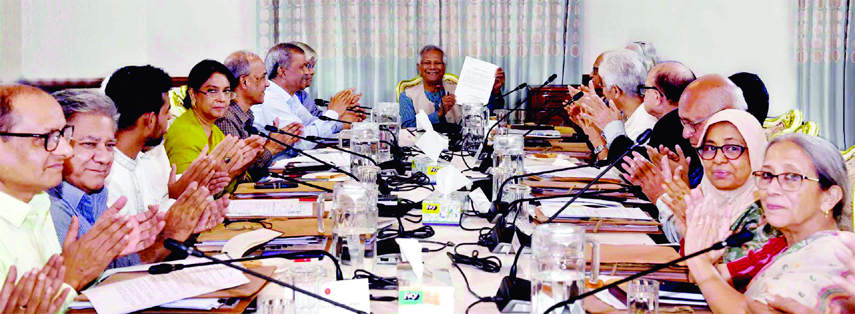Staff Reporter :
In a landmark move to safeguard its citizens, Bangladesh has signed the International Convention for the Protection of All Persons from Enforced Disappearance, aiming to prevent further enforced disappearances-a term synonymous with fear and horror in the country.
The Convention was signed by the Interim Government’s Chief Adviser, Professor Dr. Muhammad Yunus, during a government advisory council meeting on Thursday.
The signing was announced by the Chief Adviser’s Press Wing, which described the moment as a ‘historic occasion’.
The advisory council members welcomed the initiative, expressing hope that it would put an end to human rights violations in Bangladesh.
Dr. Yunus’s signing of the Convention comes just one day before the International Day of the Victims of Enforced Disappearances, making the timing particularly significant.
The International Convention for the Protection of All Persons from Enforced Disappearance was adopted on 23 December 2010 by the United Nations General Assembly through its resolution 47/133.
To date, 75 of the 193 UN Member States have ratified the Convention, with recent ratifications from Côte d’Ivoire, South Africa, Thailand, Maldives, and the Republic of Korea.
The Convention, comprising 25 articles, is a comprehensive legal instrument designed to protect individuals from enforced disappearances.
The first article unequivocally states, “No one shall be subjected to enforced disappearance.
No exceptional circumstances whatsoever, whether a state of war or a threat of war, internal political instability or any other public emergency, may be invoked as a justification for enforced disappearance.”
The second article defines ‘enforced disappearance’ as the arrest, detention, abduction, or any other form of deprivation of liberty by agents of the State or by persons or groups acting with the State’s authorisation, support, or acquiescence, followed by a refusal to acknowledge the deprivation of liberty or by concealing the fate or whereabouts of the disappeared person, thereby placing such a person outside the protection of the law.
Bangladesh has been grappling with the scourge of enforced disappearances, particularly during the 15-year tenure of former Prime Minister Sheikh Hasina.
Her rule was marked by widespread oppression, with over 700 people subjected to enforced disappearances, according to statistics from the human rights organisation Odhikar. Of these, more than 150 individuals remain missing.
Sheikh Hasina was overthrown in a student-led mass uprising on 5 August, following which she fled to India. In the aftermath, numerous individuals were released from the government’s secret detention facility, commonly known as ‘Ayanaghar’.
Despite these releases, hundreds of families continue to wait in anguish for the return of their loved ones who disappeared during Hasina’s regime, with many believed to be victims of government oppression.
Those who have returned from ‘Ayanaghar’ continue to suffer from severe trauma due to the inhumane physical and mental torture they endured during their detention.
The incidents of enforced disappearances have drawn harsh criticism from international bodies, including the UN Human Rights Commission, which has condemned them as egregious human rights violations.
The widespread human rights abuses in Bangladesh led the United States government to impose sanctions on the Rapid Action Battalion (RAB)-a joint task force of police, army, navy, air force, and border guard-on 10 December 2021.
The US Department of the Treasury attributed responsibility for more than 600 disappearances since 2009, nearly 600 extrajudicial killings since 2018, and instances of torture to RAB and other Bangladeshi law enforcement agencies.
The US Treasury Department’s sanctions targeted several high-ranking officials, including Chowdhury Abdullah Al-Mamun, Benazir Ahmed, Khan Mohammad Azad, Tofayel Mohammad Azad, Tofayel Mustafa Sorwar, and Mohammad Jahangir Alam.
Despite repeated requests from the Hasina government to lift the ban on RAB, the US government has remained steadfast.
This week, Human Rights Watch even proposed that the interim government disband RAB entirely.
International bodies have consistently called upon Sheikh Hasina’s government to conduct independent investigations into all human rights violations, including enforced disappearances. However, no such investigations were carried out during her tenure.
Following the ousting of Hasina’s government, an interim administration led by Nobel Laureate Dr. Muhammad Yunus has taken office.
In addition to signing the Convention, the interim government has established a commission to investigate the cases of enforced disappearances that occurred during Hasina’s 15-year rule.
This historic step represents a significant commitment by the Bangladeshi government to uphold human rights and ensure that such violations are never repeated in the future.




